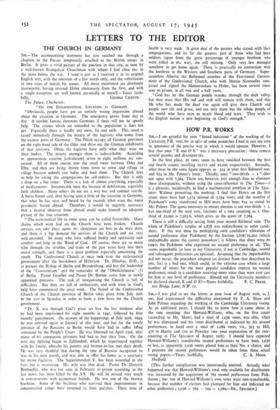HOW P.R. WORKS
SIR,—I am grateful for your " broad indication " of the working of the University P.R. vote, for in spit of some researches I had to cast my own in ignorance of the precise way in which it would operate. However, I fear that your "E and 0 E " was a necessary precaution: there remain several puzzles and discrepancies.
In the first place, 20 votes seem to have vanished between the first and fourth counts (totalling 22,111 and 22,091 respectively). Secondly, what must be the same figure appears as 354 in your first Editorial note and 854 in Mr. Palmer's letter. Thirdly, your " two-thirds " does not agree with 7,364. There are, however, just enough data to eliminate these discrepancies, without using the cross-reference to The Times—it is a pleasure, incidentally, to find a mathematical problem in The Spec- tator. Without presenting the working, I find that Harris on the first count must have had 3,574 instead of 3,594 votes, and the number of Pickthorn's votes transferred to Hill must have been 854 as stated by Mr. Palmer. The quota necessary to ensure election is not two-thirds + but one-third of the total vote, fractions of a vote counting as 1. One- third of 22,091 is 7,363.6, which gives us the quota of 7,364.
There is still a difficulty arising from your second Editorial note. The whole of Pickthorn's surplus of 2,838 was redistributed to other candi- dates. If this was done by multiplying each candidate's allocation of second preference after Pickthorn) by the fraction 2,838/10,202 (which undoubtedly seems the correct procedure), it follows that there were no vows for Pickthorn who expressed no second preference at all. This seems improbable (at least in my University, if not at Cambridge, second and subsequent preferences are optional). Assuming that the improbability did not occur, the procedure adopted (as distinct from that described by you, Sir) is a bad one, which could, in the extreme case where a large number of voters for the most popular candidate express no second preference, result in a candidate receiving more votes than were ever cast for him at any level of preference. Should not the University members
be declared elected, E and 0 E?—Yours faithfully, F. C. FRANK. zoo Bridge Lane, N.W. zz:


























 Previous page
Previous page